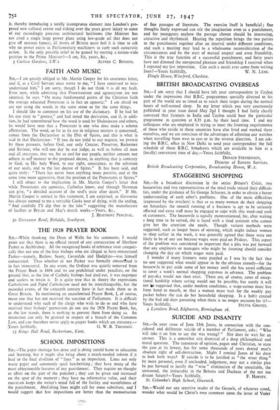FAITH AND MUSIC SIR,—I am greatly obliged to Mr. Martin
Cooper for his courteous letter, and if, as a Civil Servant once wrote to me, "I have contrived to mis- understand him," I am sorry, though I do not think it is all my fault. Even now, while admitting that Protestantism and agnosticism are not identical, he says, "On many fundamental points of the Christian faith the average educated Protestant is in fact an agnostic." I am afraid we are not using the words in the same sense or for the same things.
I should like to comment on his use of the dictionary. If he had let his eye stray to "protest," and had noted the derivation, and if, in addi- tion, he had remembered how the word is used by Shakespeare and others, he would have seen that a Protestant is one who does make a solemn affirmation. The word, so far as its use in religious matters is concerned, comes from the Declaration at the Diet of Spires, and this is what is said in that Declaration: "If you do not yield to our request, we protest by these presents, before God, our only Creator, Preserver, Redeemer and Saviour, who will one day be our judge, as well as before all men and all creatures, that we, for us and for our people, neither consent nor adhere in an manner to the proposed decree, in anything that is contrary to God, to His holy Word, to our right, conscience, to the salvation of our souls, and to the last decree of Spires." It has been said, and quite truly: "There has never been anything more positive, and at the same time more aggressive, than the position of the Protestants at Spires."
I still object to the implication in Mr. Martin Cooper's letter that while Protestants are agnostics, Catholics know, and through Newman can give, "a detailed account of the soul's state after death." If Mr. Martin Cooper is correct in this statement, I am surprised, as Gerontius has always seemed to me a veritable Cooks tour of dying, with the ending, "And carefully I'll dip thee in the lake" suggesting the manufacture of lucifers at Bryant and May's match works.—Yours, &c.,


































 Previous page
Previous page